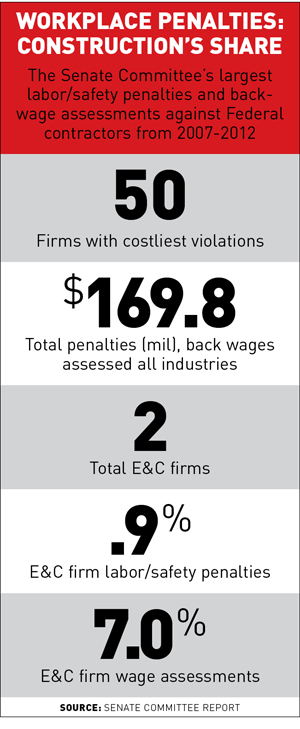
On its face, President Obama's July 31 executive order requiring federal contractors to list workplace-related violations when they submit bids and proposals is an attempt to keep persistent violators from continuing to win federal contracts.
Why, the president asks, should violators earn checks from federal taxpayers if they won't treat their workers according to federal standards?
According to the order, contracting officers and newly appointed agency "labor compliance advisors" would evaluate the violations to determine if a company was ethical or persistently out of compliance.
Below the surface, the order may be the Obama administration's best effort at completing a more worker-friendly regulatory agenda in the face of intractable congressional opposition. Significantly, AFL-CIO President Richard Trumka, speaking for unions, calls the order "good for workers, our economy and companies who play by the rules."
The order and the regulations that must be written to implement it surely will give construction a big compliance headache. It requires federal contractors to disclose 14 types of labor-law violations covering safety, health, wages, collective bargaining, civil rights and family and medical leave.
The contracting officer for a project, in consultation with the agency compliance advisor, will determine which companies demonstrate integrity and ethics in treating workers and workplace rules based on the violations and what the contractors say they have done to correct problems.
The order also states that companies with federal contracts of $1 million or more cannot require employees to participate in out-of-court arbitration for sexual assault or harassment disputes.
The rest of the order's provisions apply to contracts valued at more than $500,000, but they won't take effect until 2016 after the Federal Acquisition Regulatory Council drafts implementing rules and guidance.
The order represents a significant shift, says Jimmy Christianson, director of the Associated General Contractors' federal and heavy construction division."Contracting officers aren't lawyers, and they don't necessarily have all the facts that you would need to get through a suspension and debarment process," he says.
More complexity, says Christianson, could deter smaller contractors from competing with large businesses that have more compliance staffs. Firms with resolved violations and fines could be re-penalized via denied contracts, he adds.
Because federal agencies are unable to conveniently share information about workplace violations, President Obama emphasizes disclosure by prime contractors about their own and their subcontractors' violation records.
Federal agencies currently rely on two databases, the U.S. General Services Administration's Federal Awardee Performance and Integrity Information System (FAPIIS) and the U.S. Occupational Safety and Health Administration's Severe Violator Enforcement Program.
At the moment, FAPIIS consolidates data from the Excluded Parties List, the Past Performance Information Retrieval System and the Contractor Performance Assessment Reporting System, as well as information reported by the contractor including contract terminations for default or cause.
But the databases lack data on criminal prosecutions and fail to consolidate data about a single corporate entity in one place, according to a staff report released last December by the U.S. Senate Health, Education, Labor, and Pensions Committee.
Based partly on the report, the executive order reminds some of the short-lived executive order by President Bill Clinton near the end of his administration in 2002. It required that federal contracting officers take into account a contractor's prior three-years compliance record. President George W. Bush rescinded it.
The Obama order isn't all stick and no carrot. It rewards a prompt response to any violation and asks federal contractors reporting one to also report both remedy and preventative steps taken.
Additionally, the order offers "early guidance" following a labor law violation so that contractors can determine whether it will pose a problem for future bids.
More judgment calls could open the door to more politics.
Steve Suflas, managing partner with Philadelphia-based law firm Ballard Spahr, says the executive order would give unions more ammunition against non-union employers. "This is a way for unions to further insert themselves into the procurement process because organized labor [can] go to a procurement officer and say, 'look, this non-union contractor is a bad guy.' "
Based on the Senate committee report, construction companies don't appear to be major violators of workplace rules. The report contends that between 2007 and 2012, contractors in all industry sectors were assesses penalties totaling nearly $170 millon. The list of "severe violators" of health and safety standards includes Tyson Foods and Sea World of Florida.
Engineering and construction firms were assessed 7% of back pay totals and less than 1% of penalties involving safety infractions.
URS Corp., whose officials couldn't be reached in time to comment, ranked among the companies receiving the top 100 back-pay assessments from 2007 to 2012.
But the firm's $ 6-million assessment was dwarfed by one against Wal-Mart Stores Inc. at $31 million, and against Management & Training Corp at $21 million.



Post a comment to this article
Report Abusive Comment